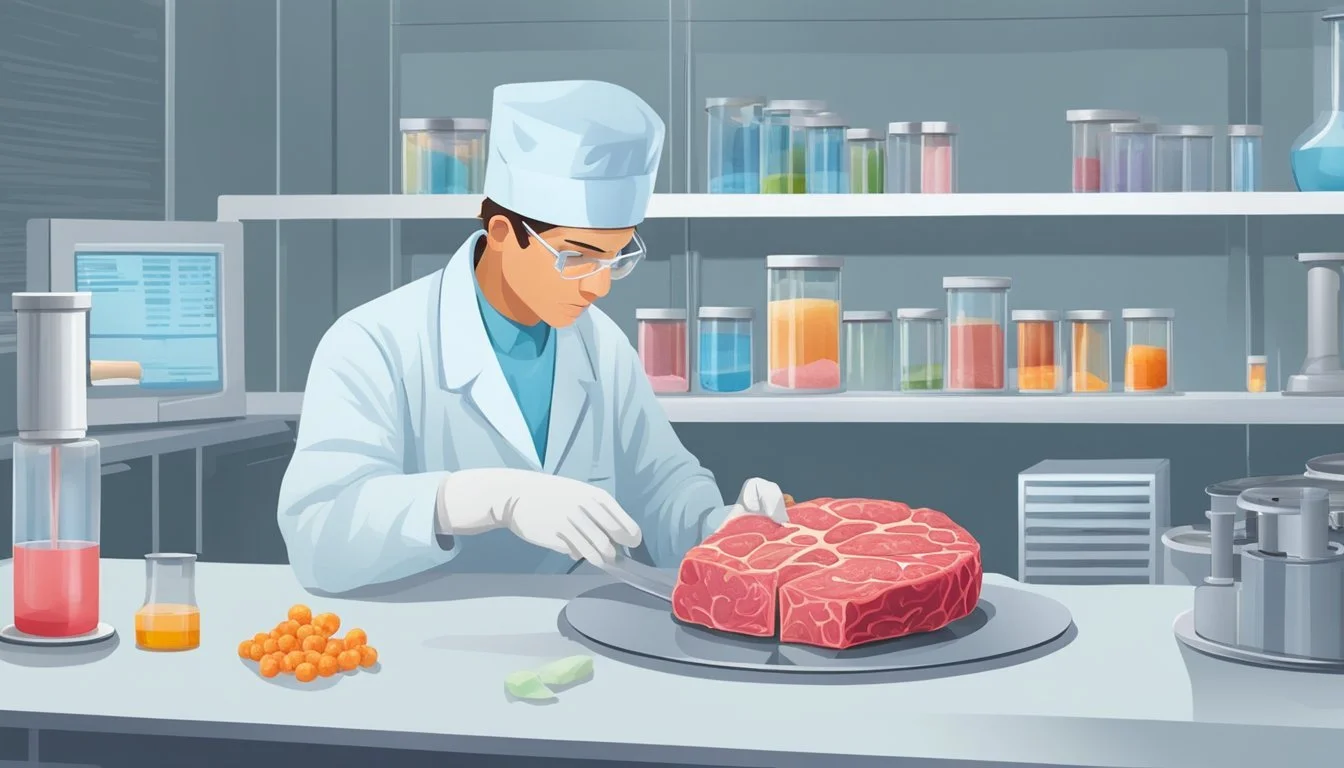Unlocking the Power of Meat
Exploring the Genova ION Test for Carnivores
Exploring the true potential of meat can significantly boost one's health, especially for those following a carnivorous diet. For individuals committed to this lifestyle, the Genova ION Test provides a comprehensive analysis of one's nutritional status, utilizing both blood and urine samples to offer insights into macronutrient and micronutrient levels.
This test assesses vital components such as amino acids and fatty acids, which are essential for optimizing health on a meat-based diet. By pinpointing specific nutrient imbalances, the Genova ION Test enables carnivores to tailor their dietary and supplement intake to achieve optimal wellness.
Dive deeper into the science of nutrient density in meat and understand how tests like the Genova ION can transform your approach to nutrition. Uncover the fascinating ways these tests can guide you in fine-tuning your diet to enhance your overall well-being and performance.
The Carnivore Diet
The carnivore diet focuses exclusively on animal-based meat, claiming to provide all necessary nutrients and offer various health benefits. It includes high protein sources from animals and is often associated with improved physical well-being.
Understanding Nutritional Science
The carnivore diet primarily consists of meat, which is rich in protein and essential nutrients like iron, zinc, and vitamin B12. Proponents argue that humans are biologically adapted to thrive on an animal-based diet. This claim is backed by certain historical and evolutionary perspectives which suggest early humans were primarily hunters and consumed large quantities of meat.
Animal-based meat provides high-quality protein that is easily digestible. It is also a dense source of essential amino acids, necessary for muscle repair, enzyme function, and overall cellular health. This diet excludes all plant-based foods, assuming animal products can entirely meet the body's nutritional requirements. Critics, however, raise concerns about the lack of dietary fiber and potential long-term health risks.
Meat Consumption and Health
Supporters of the carnivore diet report various health benefits such as improved joint health, better digestive function, and increased energy levels. Some believe that this diet can help in managing chronic illnesses and reducing dependency on certain medications. The diet's focus on high protein intake is linked to muscle maintenance and metabolic health.
Ruminant meats like beef, lamb, and venison are particularly emphasized due to their nutrient density. These meats are rich in vitamins and minerals essential for bodily functions. However, it's crucial to consider the potential risks such as increased cholesterol levels and cardiovascular concerns. Balancing meat consumption with mindful health monitoring is key to reaping benefits without adverse effects.
Genova ION Test Explained
The Genova ION Test offers a comprehensive evaluation of nutritional status, focusing on the essential biochemical markers that are vital for optimal health. It specifically aids in assessing the efficacy of a carnivore diet by looking at key factors such as amino acid profiles and nutrient levels.
Essence of the Test
The Genova ION Test, short for Individual Optimal Nutrition, provides a thorough examination of over 100 biochemical markers in the body.
It evaluates amino acids, vitamins, minerals, and other nutrients. The test helps identify imbalances and deficiencies that might be affecting one's health. This deep dive offers insights into how well the body processes nutrients from a meat-centric diet, making it valuable for individuals adhering to a carnivorous lifestyle.
Procedure and Methodology
The procedure for the Genova ION Test is straightforward. It involves the collection of blood and urine samples, which are then analyzed in a laboratory setting.
This analysis covers various key indicators, including 40 amino acids and other critical nutrients. The results are used to generate a detailed report that outlines any deficiencies or imbalances. This report helps create a personalized nutritional plan to enhance health and optimize nutrient intake, especially for those following a carnivore diet.
By understanding these patterns, individuals can better tailor their eating habits and supplementation to address specific nutritional needs, making the quest for optimal health more achievable.
Profiles of Protein
Proteins are crucial for various bodily functions, including muscle repair and enzyme production. This section breaks down different sources of protein and compares their nutritional benefits.
Varieties of Meat Proteins
Meat products offer a high concentration of quality proteins. Beef, pork, chicken, turkey, and duck provide substantial amounts of protein per serving. For example:
Beef: 26g of protein per 100g
Pork: 25g of protein per 100g
Chicken breast: 31g of protein per 100g
Turkey breast: 30g of protein per 100g
Duck breast: 23g of protein per 100g
These protein values may slightly vary depending on the cut and preparation method. Meat proteins are considered complete proteins, containing all essential amino acids the body needs for growth and repair. Heme iron found in animal-based meats also enhances iron absorption, contributing to improved metabolic processes and overall energy levels.
Plant vs Animal Protein Sources
Plant proteins, derived from sources like beans, lentils, and quinoa, also provide essential amino acids but often lack one or more of them, necessitating a varied diet to achieve a complete amino acid profile. Animal proteins, such as those from meat and seafood, are naturally complete.
Plant proteins are beneficial for those seeking fiber and various phytonutrients. However, they may not be as bioavailable as animal proteins. Hence, individuals may need to consume larger quantities to meet their protein requirements.
Seafood is another rich source of protein and offers additional benefits like omega-3 fatty acids, which support heart health. Thus, incorporating a mix of plant and animal proteins can optimize nutrient intake.
Consumer Insights and Trends
Genova ION Test data on carnivores provides a deeper understanding of current market dynamics and purchasing behaviors, highlighting key aspects like flavor preferences, health consciousness, and convenience.
Market Dynamics
The meat market continues to grow with significant dollar sales. In 2022, meat department sales reached $87.1 billion. Chicken and beef remain top choices among consumers, with value playing a crucial role in purchasing decisions.
Convenience is a major factor driving sales, as busy lifestyles push consumers towards easy-to-prepare meats. Retailers are responding by offering a variety of pre-marinated and ready-to-cook options that cater to this demand.
Purchasing Behaviors
Consumers exhibit diverse preferences when it comes to meat consumption. Surveys show that 80% of Americans identify as meat eaters and 98% of households purchase meat regularly. Health aspects also guide choices; leaner cuts and organic options are increasingly popular.
Pricing influences decisions, with many buyers looking for the best balance of price and quality. Sales promotions and discounts significantly impact purchasing patterns as well, attracting more buyers during sale periods, which retailers strategically plan throughout the year.
Beyond Meat: Alternative Proteins
The increasing demand for meat alternatives has led to a surge in plant-based options, driven by concerns over health and sustainability. The discussion below explores the key aspects of these alternatives, including the rise of plant-based options and their nutritional comparison to traditional meat.
The Rise of Plant-Based Options
The market for plant-based meats has grown significantly in recent years, with companies like Beyond Meat and Impossible Foods leading the charge. These products aim to mimic the taste and texture of conventional meat while maintaining a plant-based ingredient list.
Key ingredients often include pea protein, soy protein, and coconut oil. The Beyond Burger, one of the flagship products, utilizes beet juice for color and features pea protein as its primary protein source.
Consumers are increasingly interested in these products due to their potential health benefits and lower environmental impact. For instance, plant-based meats tend to use less water and land and generate fewer greenhouse gas emissions compared to traditional beef. This appeals particularly to vegetarian and vegan populations, as well as those interested in sustainable eating practices.
Nutritional Comparison
Nutritionally, plant-based meats aim to provide a comparable experience to beef and other conventional meats. The Beyond Burger offers 20 grams of protein per serving, primarily from pea protein, which is significant for those looking to maintain a protein-rich diet without consuming animal products.
Here's a brief comparison of Beyond Burger and a typical beef burger:
Nutrient Beyond Burger Beef Burger Protein 20 grams 19 grams Calories ~250 ~290 Total Fat 18 grams (from coconut oil) 23 grams Cholesterol 0 mg 80 mg
Beyond Meat products are designed to be lower in saturated fats and completely free of cholesterol, which can be beneficial for heart health. Also, these products incorporate ingredients like coconut oil to replicate the juiciness of meat.
By offering similar protein levels and fewer negative health impacts, Beyond Meat and other plant-based alternatives provide a viable option for those looking to reduce animal meat consumption without compromising nutrition.
Strategies for Growth and Advancement
Meat industry leaders can navigate current market trends by leveraging innovative practices and targeting health-conscious consumers effectively.
Innovation in the Meat Industry
Innovation is essential for staying competitive in the meat industry. New technologies, such as lab-grown meats and plant-based alternatives, present exciting opportunities for growth.
In-vitro meat production can appeal to sustainability-focused customers.
Meat producers can explore collaborations with tech firms to enhance production efficiency.
Offering hybrid products, combining meat with plant proteins, caters to flexitarians.
Increasing research into packaging solutions can also extend shelf life and reduce waste, aligning with sustainable practices.
Marketing to the Health-Conscious Consumer
Marketing efforts must address the growing demand for healthy lifestyles among consumers. Highlighting the nutritional value of meat and its place in a balanced diet can attract a health-conscious market.
Campaigns emphasizing organic and hormone-free options can appeal to wellness-oriented shoppers.
Partnering with dieticians to create educational content supports consumer trust.
Leveraging platforms focused on vegetarian and vegan lifestyles can promote meat as part of a varied diet.
Transparent labeling and ethical sourcing information can further enhance consumer confidence and loyalty. Engaging with health trends ensures that meat remains a key component in conscientious consumers' diets.
Culinary Experience and Recipes
Unlocking the power of meat through the Genova ION test focuses on the nutritional benefits and culinary delights associated with various meats. This section explores cooking techniques and the development of unique, flavorful recipes.
Cooking Techniques
The right cooking techniques are essential for making the most of chicken, beef, and other meats. Grilling is popular for its ability to lock in juices and flavor while creating a desirable char on the surface.
Braising combines moist and dry heat, ideal for tougher cuts like beef brisket. This method ensures the meat is tender and packed with flavors from the cooking liquid.
Roasting is perfect for larger cuts, such as whole chickens or rib roasts, emphasizing even cooking and a crispy exterior. It's crucial to balance time and temperature for optimal results.
Experimenting with various techniques adds variety to culinary experiences, ensuring the meat is both flavorful and healthy. Utilize methods like pan-searing to develop a beautifully caramelized crust while maintaining tenderness internally.
Recipe Development
Creating recipes with meat requires a balance of flavors and health considerations. Start with a base protein like chicken or beef, and consider the nutritional value each cut offers. Focusing on lean cuts can enhance health benefits without sacrificing flavor.
Incorporate a range of spices and herbs to elevate the taste. For example, garlic and rosemary pair well with roasted chicken, while cumin and paprika complement beef.
Develop recipes that provide a variety of textures and flavors. Consider methods like marinating to infuse meats with robust flavors before cooking.
Balance proteins with vegetables to create well-rounded dishes. A grilled chicken salad offers variety and nutritional value, while beef stir-fry can combine multiple flavors and textures.
Emphasize the importance of portion control in recipe development. Proper portions ensure the dishes remain healthy while delivering rich, satisfying flavors.
Carnivorous Lifestyle and Impacts
A carnivorous lifestyle involves exclusively eating animal-based products, such as meats, seafood, eggs, and limited dairy. This lifestyle carries significant health implications and diverse societal perspectives.
Health Implications
Carnivorous diets can offer various health benefits, including high intake of essential nutrients such as fats and proteins. Proponents argue that this diet can lead to improved energy levels and mental clarity.
Nutrients found in animal products, like calcium and citrate, play a critical role in bone health and cellular function. However, a diet lacking in dietary fiber from vegetables and fruits can increase the risks of heart disease and certain cancers.
Higher consumption of red and processed meats has been linked to an increased risk of various cancers, including breast cancer. It's also important to note the challenge of ensuring a balanced intake of vitamins and minerals when following an all-meat diet.
Societal Perspectives
Societal views on the carnivorous lifestyle are mixed, reflecting a range of attitudes towards diet and health. Some see the diet as a quest for optimal health and simplicity, while others question its environmental sustainability.
The production of animal products is resource-intensive, requiring significant land and water, and generating higher greenhouse gas emissions compared to plant-based foods. These environmental factors contribute to broader discussions about sustainable eating practices.
Additionally, the social dynamics of meal-sharing can pose a challenge for those following a carnivorous diet, as communal meals often include plant-based foods. Yet, the rewards for adherents often come in the form of personal health improvements and a sense of community with like-minded individuals.
Scientific Research and Findings
A comprehensive examination of the Genova ION Test for carnivores reveals insights into nutrient bioavailability and the long-term health impacts of a meat-heavy diet. The scientific community has conducted numerous studies to understand these aspects better.
Bioavailability of Nutrients
Research indicates that meat provides highly bioavailable nutrients, meaning the body can absorb and utilize them efficiently. Animal-based proteins such as those found in meat often contain essential amino acids like methionine and cysteine. These amino acids play crucial roles in various metabolic processes, including growth and immune function.
Studies have shown that meat-based diets often result in higher muscle protein synthesis rates compared to plant-based diets. This is partly because meat contains a more complete amino acid profile. For instance, lean beef has been demonstrated to lead to a 47% higher muscle protein synthesis rate compared to vegan alternatives containing equivalent protein levels.
Long-Term Health Studies
Long-term studies on meat consumption provide mixed results, but they are essential for understanding overall health impacts. Research from sources like the Power of Meat reports highlight that meat consumption remains high, with substantial household penetration and frequent purchase rates. This widespread consumption necessitates studies into its long-term effects.
Some studies suggest that moderate meat consumption within a balanced diet can contribute positively to health by providing necessary nutrients like iron, zinc, and vitamin B12. However, excessive meat consumption, especially processed meats, has been linked to potential health risks such as cardiovascular disease and certain cancers.
Proper portion control and choosing unprocessed meat cuts can mitigate these risks. Current research emphasizes the need for well-rounded dietary patterns to maximize the benefits while minimizing potential drawbacks.
Ethical Considerations
When examining the ethical considerations for carnivores using the Genova ION Test, two primary areas emerge: animal welfare and environmental impact. These areas are critical to understanding the broader implications of meat consumption.
Animal Welfare
Animal welfare concerns are central to discussions about meat consumption. Ethical considerations focus on the living conditions and treatment of animals raised for meat. Practices such as factory farming often raise serious ethical questions due to the confined spaces, limited mobility, and minimal natural behaviors allowed to animals.
Consumers increasingly seek meat products certified for humane treatment. Labels like Certified Humane and Animal Welfare Approved provide assurances of better animal welfare standards. The Genova ION Test can help consumers identify nutrient deficiencies, making it easier to choose ethical meat sources without compromising health.
Improving animal welfare aligns with ethical principles and meets growing consumer demands for ethically sourced meat. By supporting farms that prioritize animal well-being, consumers can make choices that reflect their values while maintaining health benefits provided by meat.
Environmental Impact
The environmental impact of meat production is another crucial ethical concern. Meat production, particularly beef, has significant implications for sustainability due to high resource use and greenhouse gas emissions. Water consumption, land use, and carbon footprint are major factors contributing to the environmental burden.
Sustainable practices in meat production, such as regenerative agriculture and better grazing strategies, aim to reduce these impacts. Consumers can opt for meat from sources that minimize environmental harm. The Genova ION Test aids in making dietary choices that balance personal health with environmental sustainability.
Consumers are encouraged to consider the origins of their meat and support producers using sustainable practices. Choosing meat produced with lower environmental impact helps address the ethical concerns associated with meat consumption while benefiting health.
Concluding Thoughts
The Genova ION Test offers an insightful deep dive into the health parameters critical for those following a carnivorous diet.
By measuring various biomarkers, the test provides a comprehensive look at nutrient levels, metabolic function, and potential deficiencies.
Key Takeaways:
Enhanced Nutrient Monitoring: The test identifies essential nutrients like amino acids, fatty acids, and vitamins.
Metabolic Insights: It assesses metabolic functions, helping individuals optimize their diet for better energy utilization.
Personalized Recommendations: Results can guide dietary adjustments for improved health outcomes.
Future Outlook:
Increased accessibility of advanced nutritional tests.
More personalized dietary plans based on precise biomarker data.
Greater awareness and understanding of nutrient deficiencies and metabolic health.
For those committed to a carnivorous lifestyle, the Genova ION Test serves as a valuable tool for fine-tuning their nutritional intake and achieving optimal health.











